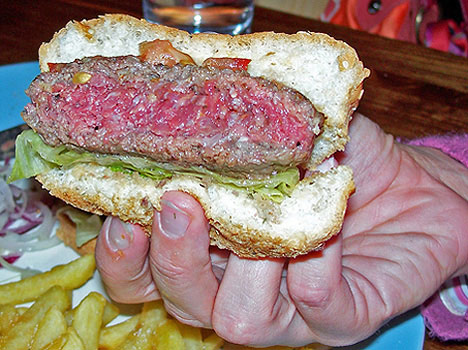According to Ben Muessing of AOL, North Carolina’s food safety laws create visions of a nanny state: restaurant patrons can’t legally get a rare or medium rare burger.
Muessing writes:
There may be no food more American than the burger. And according to meat lovers, there may be no health code regulation less American than North Carolina’s rare and medium rare burger ban.
From Winston-Salem to Nags Head, meat eaters are unable to order their burgers rare or even medium rare thanks to a state restriction that requires restaurants to cook ground beef to an internal temperature of 155 degrees Fahrenheit (for 15 seconds -ben).
That’s enough heat to sufficiently kill dangerous bacteria like E. coli, according to state health officials. But it’s also enough heat to kill all of the flavor, according to Raleigh resident and rare burger aficionado Steven Elliot. "I don’t believe in a nanny state when it comes to food," said Elliot, who told AOL Weird News he would order his burgers "bloody" or "ready to moo" if he could. "I don’t like the government telling us what we can and cannot eat," he added.
My Twitter friend Kathleen Purvis of the Charlotte Observer, also comments on why the regs are currently in place:
"People complain about it," said Purvis, "but I understand where the concern is on undercooked beef. There is a concern about putting your kid at risk." Though she wants the state to keep undercooked meat from being served to children and the elderly (two groups that face heightened risks of serious infections from E. coli O157:H7), Purvis sees ordering a rare or medium rare burger as the kind of decision adults should have the right to make.
I get that. Undercooked beef is analogous to unpasteurized apple cider, raw oysters and sprouts — all foods that carry increased risks for foodborne illness. When I have the choice, I’m still ordering burgers to 160F.
North Carolina is on track to adopt the FDA food code in the next couple of years and that legislative change will result in the dropping of the temperature requirements. The new regs will place the choice to provide undercooked, risky product in the hands of the businesses who sell them. Restaurants will have to judge how much risk they are comfortable with. Serving a burger that contains pathogens and makes patrons ill, regardless of the law and disclaimers, is bad business.
As an added bonus to the AOL post, there’s a companion video on how to make juicy burgers at home. Food safety apparently still isn’t sexy enough when it comes to recipes, cooking shows and instructional YouTube videos (In 2004 we heard similar comments from the Food Network after publishing on food safety mistakes by celebrity chefs).
The video provides a nice instruction on how to indirectly cross-contaminate (raw meat-y hands grabbing the bbq lid, hands to tongs. Hands back to the lid. Who knows whether there was any handwashing before the same hands touched garnish and buns). Since not using a thermometer was a central theme to the article, it’s also appropriate that the BBQ dude used the squish test to evaluate doneness, "Firm but not too squishy — they’re done."
What temperature is not too squishy?
